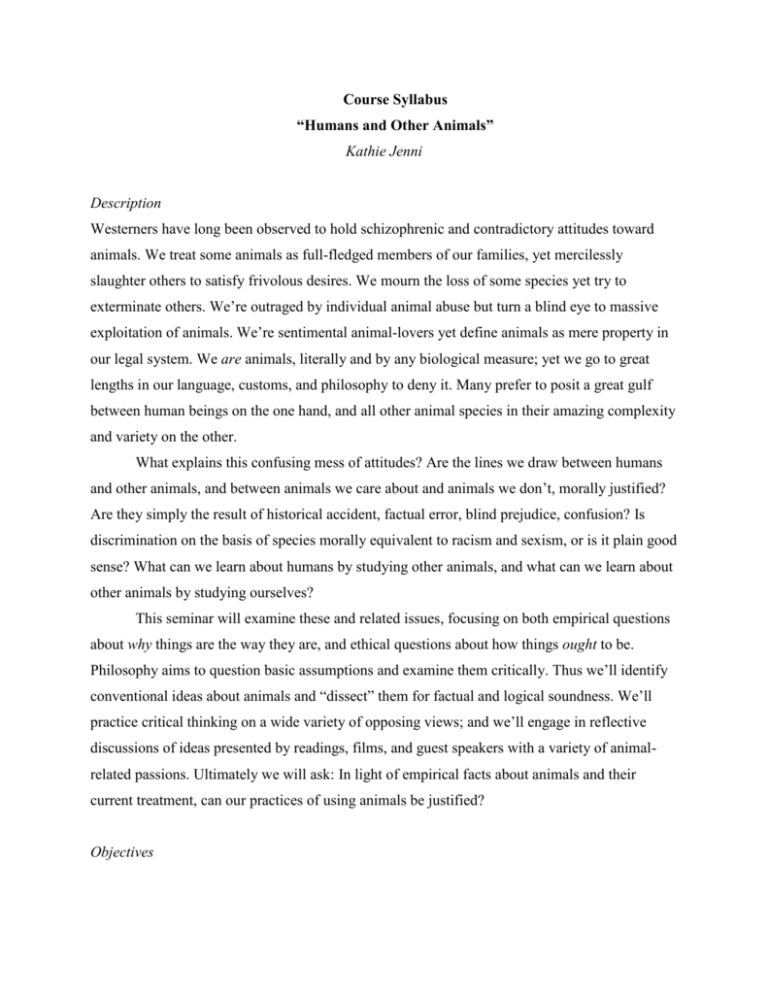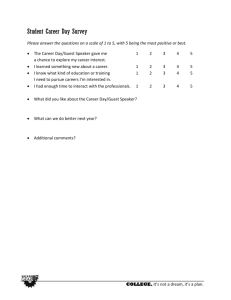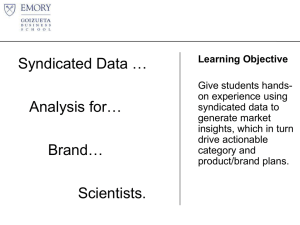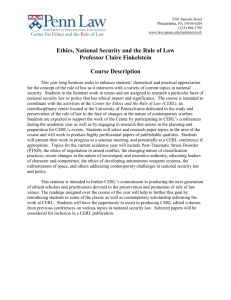Humans and Other Animals: Kathie Jenni
advertisement

Course Syllabus “Humans and Other Animals” Kathie Jenni Description Westerners have long been observed to hold schizophrenic and contradictory attitudes toward animals. We treat some animals as full-fledged members of our families, yet mercilessly slaughter others to satisfy frivolous desires. We mourn the loss of some species yet try to exterminate others. We’re outraged by individual animal abuse but turn a blind eye to massive exploitation of animals. We’re sentimental animal-lovers yet define animals as mere property in our legal system. We are animals, literally and by any biological measure; yet we go to great lengths in our language, customs, and philosophy to deny it. Many prefer to posit a great gulf between human beings on the one hand, and all other animal species in their amazing complexity and variety on the other. What explains this confusing mess of attitudes? Are the lines we draw between humans and other animals, and between animals we care about and animals we don’t, morally justified? Are they simply the result of historical accident, factual error, blind prejudice, confusion? Is discrimination on the basis of species morally equivalent to racism and sexism, or is it plain good sense? What can we learn about humans by studying other animals, and what can we learn about other animals by studying ourselves? This seminar will examine these and related issues, focusing on both empirical questions about why things are the way they are, and ethical questions about how things ought to be. Philosophy aims to question basic assumptions and examine them critically. Thus we’ll identify conventional ideas about animals and “dissect” them for factual and logical soundness. We’ll practice critical thinking on a wide variety of opposing views; and we’ll engage in reflective discussions of ideas presented by readings, films, and guest speakers with a variety of animalrelated passions. Ultimately we will ask: In light of empirical facts about animals and their current treatment, can our practices of using animals be justified? Objectives 1. To develop your abilities to do philosophy—that is, to ask fundamental questions, examine personal and cultural assumptions, identify and evaluate the arguments of others, form wellreasoned arguments for positions of your own—and through these means to live examined lives. 2. To introduce you to human–animal ethics: issues, methods, and prominent positions in the field. 3. To deepen our understanding of non-human animals, human animals, and relationships between them. 4. To help you develop college reading, writing, research, and discussion skills. Texts The Animal Ethics Reader edited by Susan J. Armstrong and Richard G. Botzler (New York: Routledge, 2003) Doing Honest Work in College by Charles Lipson (Chicago: University of Chicago Press, 2008) Other readings will be made available on Blackboard or through handouts distributed in class. Requirements and Grading 1) Day-to-day Participation: Informal Written Reflections/Journal and In-class Discussion (roughly twenty-five percent of course grade): You’ll be asked to keep a journal of your reactions and thoughts about our subjects throughout the course. I’ll expect you to write (roughly) an entry in preparation for each class session, recording your comments about what you find valuable, mistaken, puzzling, or simply thought-provoking about the readings and guest presentations. In addition, I’ll ask you to bring the journal to class each day so that after films and selected activities, I can ask you to record your reactions and thoughts in the journal. (I will sometimes, but not always, furnish specific questions for you to write about.) You should write roughly two to three pages per week in your journals. I’ll ask to see them two or three times during the semester so that I can see how you’re engaging with our topics and what you’ve been thinking about. The “participation” dimension of your grade encompasses productive engagement in class discussions, thoughtfulness in informal written reflections, improvement over the course of the semester, and overall effort. Mid-way through the semester, I’ll let you know of your mid-term “participation” grade and give you suggestions (if needed) for improving it. 2) Two Take-Home Essay Exams (roughly fifty percent of course grade): These open-book exams will require you to explain particular issues and opposing viewpoints that we have studied, as well as to critique each of those viewpoints (i.e., to identify their strengths and weaknesses). Each exam will require your writing roughly six to eight pages. The first will fall due around Week Five and the second around Week Nine. 3) Independent Research Project (roughly twenty-five percent of course grade): I’ll ask you to select a topic of particular interest to you and do a special project on it. The project will involve researching the topic, finding pertinent literature through a library search, and completing a twelve- to fifteen-page paper on it. When the time comes, I’ll provide more specific guidance, but the paper will require that you discuss an ethical issue involving human–animal relations, present at least two competing viewpoints about it, critique each of those positions, and defend your own perspective on the issue. Your topic may overlap one that we consider in class, or it may be something outside of class topics, so long as it engages human–animal relations. This project is a multi-stage one: you will be asked to select a topic by the end of Week Six, provide an annotated bibliography by the end of Week Eight, submit a rough draft of at least ten pages that includes documentation of your sources by the end of Week Eleven, and turn in the final draft along with the rough draft containing my feedback by Week Fourteen. There will be no in-class final for this class, but I ask that you reserve the scheduled final time-period so that we can use it for final discussions or presentations. Topics and Readings Unless otherwise stated, essays are found in Armstrong and Botzler or Singer and Regan. Week 1: Topic Introduction Film: The Witness 2–3: Animal Minds Film: Why Dogs Smile and Chimps Cry Readings from Aristotle, Descartes, Darwin, and Kant. Barbara Smuts: “Reflections.” Bernard Rollin: “Animal Pain.” Marian Stamp Dawkins: “Animal Minds and Animal Emotions.” Jaak Panksepp: “The Rat Will Play.” Donald R. Griffin: from Animal Minds: Beyond Cognition to Consciousness Guest Speaker: Professor Julie Shuler, Communicative Disorders/Canine Support Teams. 4–5: Theories of Animal Ethics Kant: “Duties in Regard to Animals” Peter Singer: from Practical Ethics. Tom Regan: The Case for Animal Rights. Carl Cohen: “Reply to Tom Regan.” David DeGrazia: “Equal Consideration and Unequal Moral Status.” 6–7: Animals for Food Films: 45 Days: The Life and Death of a Broiler Chicken; Death on a Factory Farm David DeGrazia: “Meat-Eating.” Françoise Wemelsfelder: “Lives of Quiet Desperation.” Animal Agriculture Alliance: “Animal Agriculture: Myths and Facts.” Temple Grandin: “Thinking Like Animals.” Hettinger: “Bambi Lovers Versus Tree Huggers.” Jennifer Everett: “Vegetarianism, Predation, and Respect for Nature.” 8–9: Animal Experimentation Guest Speaker: Dr. Lisa Olson, Biology. Regan: from The Case for Animal Rights. David DeGrazia: “The Ethics of Animal Research: What are the Prospects for Agreement?” Baruch A. Brody: “Defending Animal Research: An International Perspective.” 10–12: Wildlife, Hunting, Fishing, and Global Climate Change Guest Speaker: Dr. Mariana Altrichter, Environmental Studies J. Baird Callicott: “The Philosophical Value of Wildlife.” Marti Kheel: “The Killing Game: An Ecofeminist Critique of Hunting.” Alastair S. Gunn: “Environmental Ethics and Trophy Hunting.” David Foster Wallace: “Consider the Lobster.” Guest Speaker: Kassie Siegel, J.D., Center for Biological Diversity 13: Zoos and Aquariums Michael Hutchins, Betsy Dresser, and Chris Wemmer: “Ethical Considerations in Zoo and Aquarium Research” Dale Jamieson: “Against Zoos.” 14: Concluding Reflections










